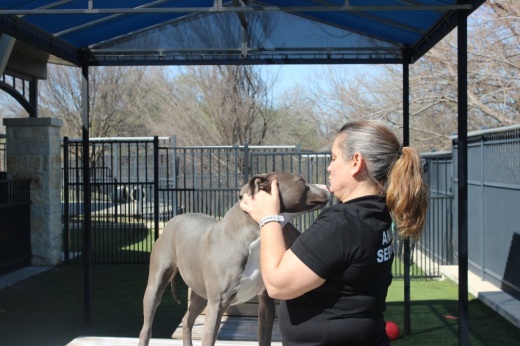If approved, a portion of the bond package would help alleviate issues created by an intake increase at the shelter over the last few years. Lewisville Animal Services Administrator Amanda Earl said that increase could be attributed to several factors.
“There is a much greater economic strain on people,” she said. “The stress of life as we know it now makes people less able to cope with some issues they may be having [with] their animals.”
An average of 2,800 animals are brought to the shelter annually, Earl said. Its overcapacity rate is consistently over 90%.
“We have not had less than 24 adoptable dogs for years now,” she said. “Our threshold is 20.”
What’s happening?
About every 10 years, Lewisville officials ask voters to approve a bond sale to continue improving the city, City Manager Claire Powell said.
The last time voters saw an infrastructure bond was in 2015 when they approved $135 million in four propositions. In 2021, voters passed a $95 million bond to construct a joint public safety complex for the police and fire departments.
“We wanted to make sure we took our time, and we looked at long-range plans,” Powell said.
The bond package’s creation was nearly a year and a half in the making, city officials said. The Blue Ribbon Committee, which featured eight Lewisville residents, was initially presented with 68 projects totaling nearly $1 billion, committee Chair Karen Locke said. After collaborating with city officials, the package was finalized with 24 priority projects.
Explained
Lewisville Finance Director David Erb said the median home value is $351,567. Owners of a house at that value would see a maximum increase of $4.39 per month if the bond is approved.
The maximum tax rate increase would be $0.015, though he said the three bond packages approved since 2003 have not resulted in a property tax rate increase.
“[City officials] will do everything in their power not to have a tax increase,” Locke said. “There’s nothing in this bond that I consider frivolous. Everything is something we need to move forward as a city.”
Diving in deeper
Road projects account for $198.9 million of the bond. All told, more than 40 roads or streets are listed. Some of the notable projects include:
- Supplemental funding for Corporate Drive expansion
- Rebuilding of Allen Road, Lone Oak Street, Willow Street, Hardy Street, Birch Street and Ash Street as part of McKenzie-Hembry Neighborhood Rehab, Phase 2.
- Rebuilding South Kealy Avenue as a commercial collector street
- Rebuilding South Charles Street
- West College Street paving and drainage work, from I-35E to Cowan Avenue. This would be phase two of a project.
What else?
The proposed $9.9 million expansion of Lewisville’s animal shelter would potentially add:
• A surgical suite
• More kennel spaces
• Expansion of the laundry facility
• Separation of dog and cat intake areas
• Additional staff-dedicated workstations and a third supervisor office
The bond would address some of the facility’s capacity issues. For example, its sterilization room currently doubles as a multipurpose room.
“[When] surgeries are happening in that room, we can’t do our dishes.... We can’t [bathe the animals],” Earl said.
Expanding the shelter would allow for more dogs to be cared for, which could help reduce euthanasia rates, said Brittney Young, Lewisville resident and volunteer.
"Having more space will help relieve some of the capacity issues," Earl said.
Other proposed bond projects include purchasing land for a new fire station and park upgrades, including redevelopment at Lake Park.
“We want to restore that recreation out there,” Powell said.
An online survey gathered about 1,500 responses on what residents want to improve in Lewisville, said James Kunke, community relations and tourism manager.
“We use this input, but we get people who don’t want to share their input and unfortunately have chosen to not make their voice part of the process,” Kunke said.
Looking ahead
If the bond passes:
- Bonds would be issued this year and design work would start on the highest-priority projects, city officials said.
- Construction could start later this year or in 2025 depending upon project scale and complexity.
- City staff would then evaluate and determine which projects are the most critical.
- Funding for other projects would likely need to be reallocated in order to fund the critical projects.






